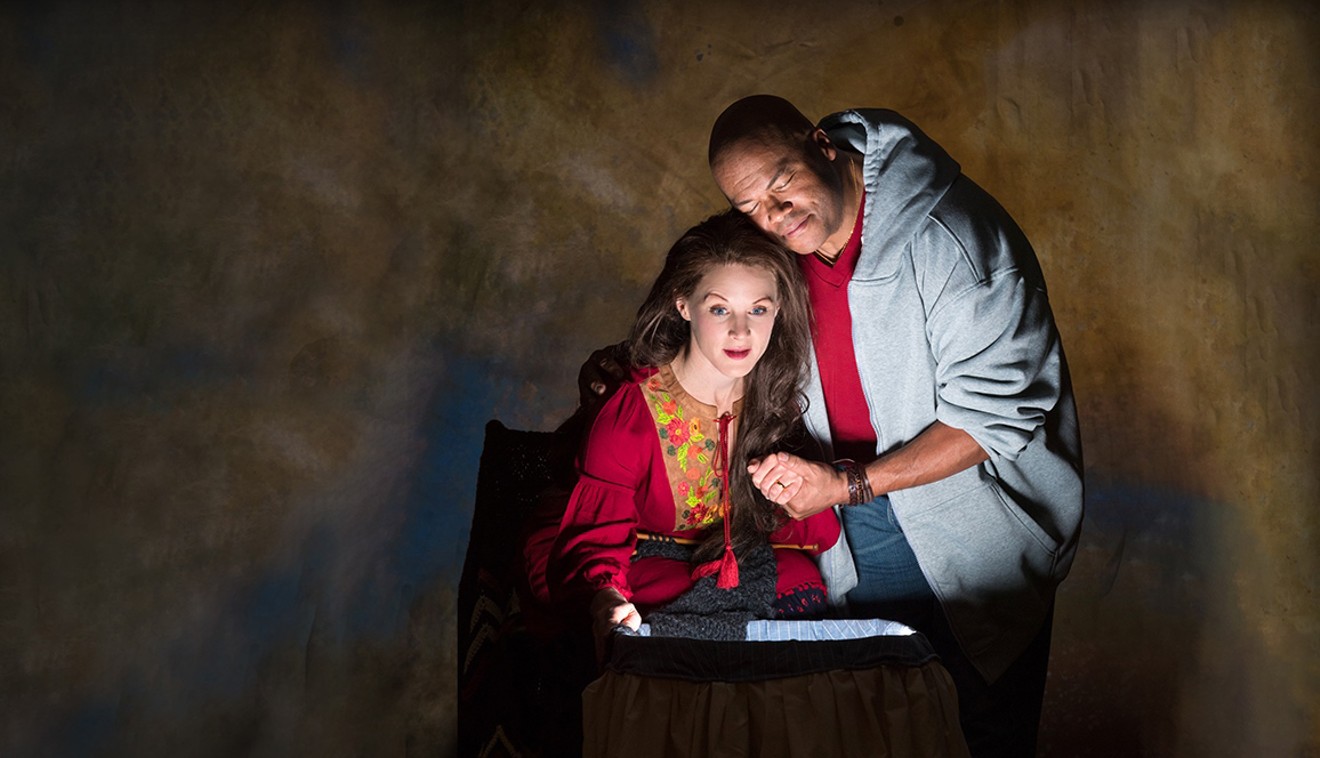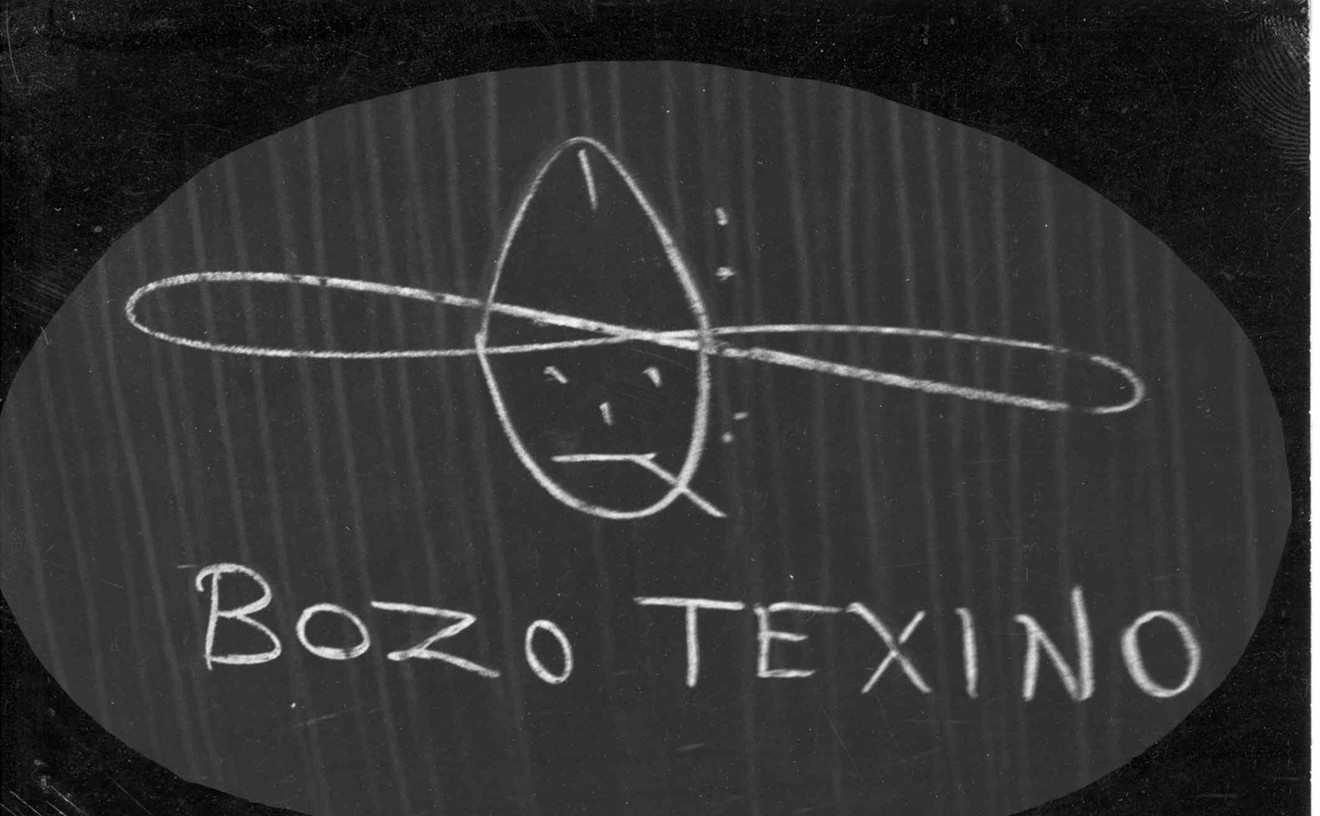The first two-thirds of The Electric Baby, a play filled with myth, fantasy and story now having its regional premiere at the Arvada Center, are a delight. After that, the evening descended into metaphorical murk. At the beginning, I loved Jessica Robblee’s performance in the central role of Natalia, a Romanian mother keeping watch beside her dying child — a magical baby, already half in another world, who’s represented by a small form attached to glowing white tubes. Robblee begins the evening with a brief lecture to the audience about coughing, and our propensity as Americans to drink enormous coffees topped with whipped cream that send us running to the toilets; she was also full of advice on other issues, from how to cure a headache with a strategically placed banana peel to eradicating personal stinkiness by placing cut potatoes in our armpits.
I also loved the group of characters brought together by another woman’s uncontainable rage and grief over the loss of her own child: Helen, the grieving mother; Ambimbola, the cab driver who crashed in an attempt to avoid Helen as she either fell or deliberately stepped into the road; passengers Rozie, a prostitute, and Dan, expressing their longtime friendship through drunken cursing and mutual abuse. Like Natalia, these people are fascinating, as are their differing predicaments, and author Stefanie Zadravec has created lively and absorbing scenes, from the vigil kept by Rozie at Ambimbola’s hospital bed after the accident, to Helen’s attempts to atone for her impulsive gesture by bringing gifts of juice to the victims, through the lunch during which Helen’s lonely husband, Reed, attempts to communicate with a suspicious and volatile Rozie, who thinks he’s looking for sex. There’s also the way that Dan, who died in the crash, manifests himself to a traumatized Rozie through the voices and bodies of living people — a nurse, a waiter.
The supernatural is always present, along with the elemental grief of mothers who have lost their children. Mythical meanings vibrate through the text. Fantastical elements — including the silent child at the center of the action — raise questions we’re anxious to see answered: Will Reed and Helen reconcile? Can Rozie calm down and deal with what’s happened while also accepting the friendship of kindly Reed? We learn that Ambimbola’s situation could serve as fodder for one of Donald Trump’s racist anti-immigrant tirades: He’s in the country illegally, and the cab he was driving wasn’t his own. He’s lost the use of both his legs, and what will happen to him now?
Watching all this, I’m composing effusions of praise in my mind for the play’s wit, depth and originality; for the adventurous choices of artistic director Lynne Collins (The Electric Baby is playing in repertory with Sense and Sensibility and All My Sons); and for the fine acting by the cadre of actors employed for the season by the Arvada Center: Robblee’s sad, funny, eccentric Natalia; Kate Gleason’s repressed Helen; Greg Ungar as kindly and subdued Reed; the crackling energy Emelie O’Hara gives Rozie; Lance Rassmussen’s Dan, switching from pleasant normalcy to frothing rage on the instant according to Rozie’s feverish imaginings; and Abner Genece, whose Ambimbola couldn’t be funnier, wiser or more appealing.
But then there’s a shift away from the specific, and the pleasure I’ve been taking in the production begins seeping away. We get a far-too-long story about how Ambimbola and Natalia met — not remotely credible but, hey, this is magic realism — accompanied by an interpretive dance performed by masked figures. (I debated whether it was the text that faltered at this point or whether the problem was the dance, which was clumsily presented; I concluded it was both.) None of the predicaments presented earlier in the play are explored in any depth; none of the questions are answered. Instead, there’s a sequence of supposed folktales and a lot of metaphors: the moon, shining bones, a shepherd boy, a mother crow rescuing her fallen nestling. At this point, the imagery doesn’t enhance the narrative, but instead takes the place of structure, depth and resolution. The delight evaporates, and the evening ends with a sad thud.
The Electric Baby, alternating with Sense and Sensibility and All My Sons at the Arvada Center Black Box Repertory Theatre through May 4, 6901 Wadsworth Boulevard in Arvada, 720-898-7200, arvadacenter.org.
[
{
"name": "Air - MediumRectangle - Inline Content - Mobile Display Size",
"component": "12017618",
"insertPoint": "2",
"requiredCountToDisplay": "2"
},{
"name": "Editor Picks",
"component": "17242653",
"insertPoint": "4",
"requiredCountToDisplay": "1"
},{
"name": "Inline Links",
"component": "18838239",
"insertPoint": "8th",
"startingPoint": 8,
"requiredCountToDisplay": "7",
"maxInsertions": 25
},{
"name": "Air - MediumRectangle - Combo - Inline Content",
"component": "17261320",
"insertPoint": "8th",
"startingPoint": 8,
"requiredCountToDisplay": "7",
"maxInsertions": 25
},{
"name": "Inline Links",
"component": "18838239",
"insertPoint": "8th",
"startingPoint": 12,
"requiredCountToDisplay": "11",
"maxInsertions": 25
},{
"name": "Air - Leaderboard Tower - Combo - Inline Content",
"component": "17261321",
"insertPoint": "8th",
"startingPoint": 12,
"requiredCountToDisplay": "11",
"maxInsertions": 25
}
]












